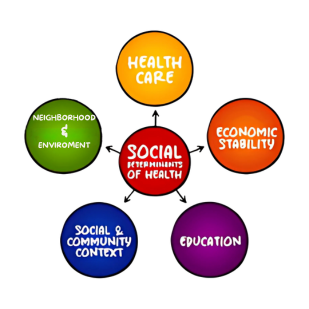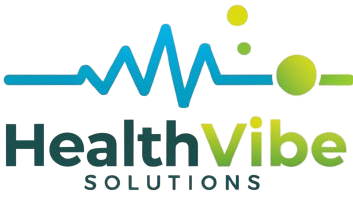When we think about health, we typically focus on medical treatments or lifestyle choices like diet and exercise. But there’s much more affecting our health behind the scenes. Social determinants of health (SDOH) have a crucial role in shaping the well-being of individuals and communities. In this article, we’ll explain what SDOH are, how they affect health outcomes, and the work of organizations like Mosaic Health in tackling these vital concerns.

What Are Social Determinants of Health (SDOH)?
Social determinants of health refer to the conditions in which people are born, grow, work, live, and age. These determinants significantly influence health outcomes and can either promote or hinder a person’s ability to live a healthy life.
Overview of Social Determinants
Factors such as education, money, work, social support, and access to healthcare are examples of SDOH. These variables may generate benefits or disadvantages for health, depending on whether people have easy or restricted access to resources.
Examples of SDOH: Education, Employment, and More
- Education: Higher education frequently leads to greater work prospects, which directly affect economic stability and access to healthcare.
- Employment: Secure work gives health insurance and financial resources that contribute to a person’s overall health.
- Neighborhood and Environment: Living in a safe neighborhood with access to clean air, parks, and food shops directly influences physical and mental health.
The Impact of Social Determinants on Health Outcomes
Social variables impact how long and how well people live. Addressing them may enhance health equality and decrease disparities in healthcare.
How Education Influences Health
People with higher levels of education tend to live longer and healthier lives. Education impacts health literacy, access to well-paying work, and the ability to fund healthcare services.
Role of Economic Stability
Economic stability gives individuals the potential to obtain healthcare, maintain a good diet, and live in safe, secure houses. Without financial resources, health outcomes can dramatically worsen.
Access to Healthcare: A Crucial Factor
Without easy access to healthcare services, many preventable ailments go untreated, contributing to worsened health outcomes. The ability to access regular checks, vaccines, and emergency care is crucial for keeping good health.
Mosaic Health: A Solution to Address SDOH
What Is Mosaic Health?
Mosaic Health is a community-based health organization that delivers comprehensive healthcare services, focusing on solving the socioeconomic aspects that impact patient health. Their mission is to give economical, accessible healthcare for everyone, regardless of socioeconomic status.
Mosaic Health’s Mission and Approach
Mosaic Health’s approach emphasizes preventative care, community participation, and education to target the root causes of poor health outcomes associated with socioeconomic problems. They attempt to decrease health inequities by delivering services that appeal to disadvantaged communities.
How Mosaic Health Addresses Social Determinants of Health
Integrated Healthcare Services
Mosaic Health mixes medical, dental, and behavioral health services to deliver holistic therapy. By addressing multiple aspects of health, they may more effectively face the numerous obstacles posed by socioeconomic variables.
Community-Based Initiatives
Mosaic Health conducts community projects seeking to promote education, job options, and health knowledge. These approaches help individuals make better choices while also targeting some of the deeper structural challenges at play.
Education and Prevention Programs
Education is vital to prevention. Mosaic Health delivers lectures and seminars concentrating on preventive care, such as how to manage chronic diseases, the significance of vaccines, and techniques to live a healthy lifestyle.
The Role of Healthcare Providers in Addressing SDOH
Training Healthcare Workers on SDOH
Healthcare practitioners need to be aware of the socioeconomic concerns their patients confront. Mosaic Health trains its physicians to detect socioeconomic determinants and incorporate that knowledge into treatment regimens, boosting overall care.
Collaborative Care Models
Mosaic Health provides a collaborative care strategy, working with community partners to address food poverty, housing issues, and mental health help, making a well-rounded approach to healthcare practical.
The Importance of Health Equity
What Is Health Equity?
Health equality is ensuring that everyone has the possibility to reach their highest degree of health. This means removing hurdles to health that are produced by social, economic, or environmental sources.
How Mosaic Health Promotes Health Equity
Mosaic Health’s activities largely target poor people to decrease health disparities. By delivering affordable therapy and focusing on education, they help attain more equitable health results.
Mosaic Health’s Focus on Vulnerable Populations
Addressing Racial and Ethnic Disparities
Certain racial and ethnic groups have larger prevalence of disease due to institutional inequalities. Mosaic Health attempts to fill this gap by offering culturally appropriate treatment and services suitable to these groups.
Support for Low-Income and Rural Communities
Rural people usually lack access to healthcare facilities. Mosaic Health combats this by giving treatments directly to these populations via mobile clinics and relationships with local organizations.
Innovative Programs by Mosaic Health to Improve Health Outcomes
Mobile Health Clinics
To reach underprivileged communities, Mosaic Health delivers mobile health clinics, assuring that those without mobility or local facilities may still access important healthcare treatments.
Preventative Care Initiatives
Preventative care is an emphasis at Mosaic Health. By giving vaccines, screenings, and health education, they aid communities minimize the risk of chronic diseases and boost long-term health outcomes.
Challenges in Addressing Social Determinants of Health
Systemic Barriers
Addressing SDOH is hard, as it entails tackling larger social systems like housing, education, and jobs. Mosaic Health continually battles against these challenges, yet institutional impediments may limit progress.
Limited Resources and Funding
Community health organizations frequently meet restricted finances, making it difficult to address all socioeconomic determinants at once. Mosaic Health relies on partnerships and donations to sustain delivering critical services.
Why Tackling SDOH Is Critical for Long-Term Health Solutions
SDOH and Chronic Disease Prevention
By tackling socioeconomic variables early on, chronic diseases such as diabetes, hypertension, and heart disease may often be prevented, boosting both quality of life and longevity.
Reducing Healthcare Costs by Addressing SDOH
Investing in SDOH projects may lower the long-term expenses of healthcare. By preventing diseases and keeping people healthy, fewer resources are necessary for emergency care and chronic disease management.
The Future of Healthcare and Social Determinants
Integrating Technology and SDOH
As technology develops, it’s growing easier to monitor and manage SDOH. Tools like electronic health records (EHRs) help healthcare practitioners to recognize social factors in patient care plans, enabling more individualized treatments.
The Growing Role of Community Health Centers
Community health clinics like Mosaic Health are leading the way in addressing socioeconomic determinants of health. As increased attention is dedicated to these components, we may expect to see more enterprises following Mosaic’s path.
Case Studies: How Mosaic Health Is Making a Difference
Successful Outcomes in Underserved Communities
Mosaic Health has found remarkable success in improving health outcomes in places that are often overlooked. Their work in rural and low-income communities have cut hospital visits and improved overall health statistics.
Mosaic Health’s Partnerships with Local Organizations
By cooperating with local NGOs, schools, and corporations, Mosaic Health improves its reach and offers more thorough therapy. These ties are key to their effectiveness in fighting SDOH.
How You Can Help Address Social Determinants of Health
Volunteering with Health Organizations
Consider volunteering with groups like Mosaic Health to support their work in your community. Volunteers play a key role in administering programs and offering aid to persons in need.
Supporting Policies for Social Justice and Health Equity
Advocate for policies that address SDOH, such as affordable housing, universal healthcare, and good wages. These changes may have a big effect on public health.
Conclusion: The Importance of Addressing Social Determinants of Health
Addressing socioeconomic determinants of health is crucial for reaching long-lasting advances in health outcomes. Organizations like Mosaic Health play a key role in this quest, offering treatment and aid to the most disadvantaged individuals. By identifying and addressing SDOH, we may progress towards a future where health equality is a reality for everyone.
FAQs
What are social determinants of health?
Social determinants of health are non-medical variables such as education, income, and living situations that impact overall health outcomes.
How does Mosaic Health address SDOH?
Mosaic Health delivers integrated healthcare, community outreach, and educational initiatives to combat socioeconomic determinants of health.
Why is health equity important?
Health equality assures that everyone has the same chance to attain excellent health, regardless of social, economic, or environmental limitations.
How can I support organizations like Mosaic Health?
You may give your time, contribute, or lobby for policies that promote health equality and address socioeconomic factors.
What are some examples of SDOH?
Examples include education level, work situation, access to healthcare, and neighborhood safety. These variables greatly affect health outcomes.


